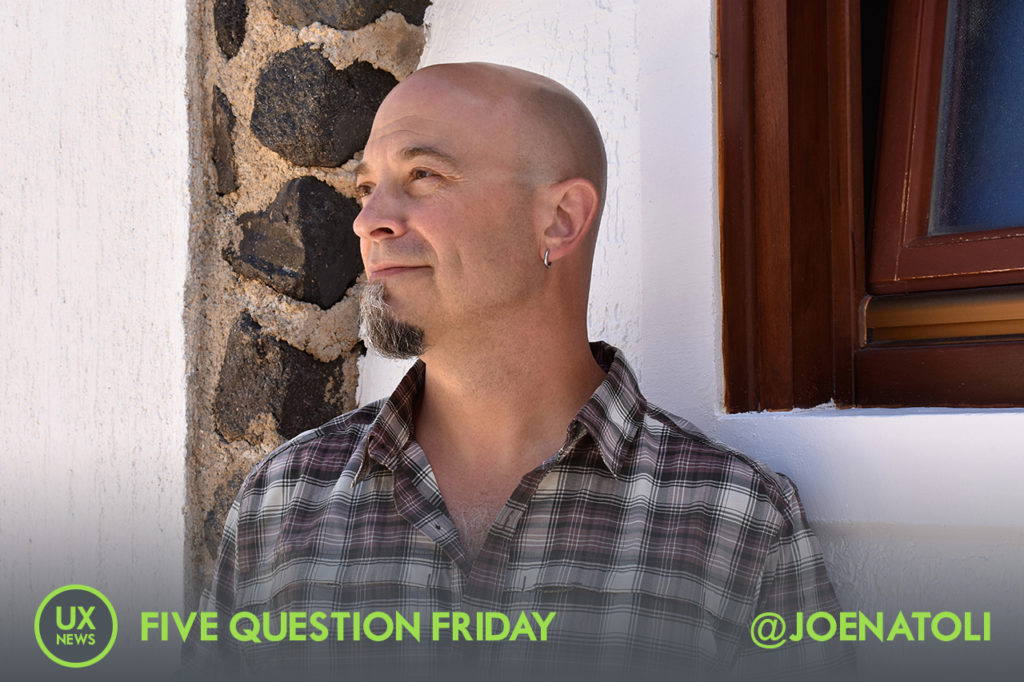We’re proud to start off our series of Five Question Friday, where we’ll ask five burning UX questions from a top UXer.
Our first guest is Joe Natoli, one of the top UX educators in the country, host of the “Making UX Work” podcast, and devoted Cleveland Browns fan. For more than 26 years, Joe has been speaking publicly about UX at global conferences, and his two most popular UX courses – User Experience Design Fundamentals and UX & Web Design Master Course – have more than 90,000 enrolled students.
What’s more, his Twitter account, where Joe drops amazing knowledge daily, is a must-follow for any in the UX world.
With Joe’s busy schedule, we were lucky to get a chance to ask him a few questions. And Joe, being his usual, giving self, took the time to give us some great, in-depth answers, including reflections on everything from what brought him into UX and the fate of his beloved Browns. Here is your Five Question Friday with Joe Natoli.
1.) What originally attracted you to teaching others in the field?
It’s hard to say what the initial attraction was, but I have wanted to be in front of people since I was a kid. And as I got older, I began to notice that I felt really comfortable, really happy, really present, in situations where I was teaching someone to do something, sharing what I know, helping.
There’s something immeasurably powerful that happens when you help somebody get to a moment of realization, where the light bulb goes on, so to speak. That moment of recognition, the joy they feel connected to an “I get it,” or “I can DO this” moment. It’s hard to explain, but it’s powerful stuff — like a high without the drugs.
Nothing brings more warmth to my heart than the things people say to me about my books, my courses, or even my consulting sessions. When someone tells me just how much you’ve helped them, that you’ve been instrumental in getting them past some difficulty, that they feel empowered now…the emotion in my heart is just beyond words.
I always feel a deep, profound sense of honor, and I use that word a lot. I feel honored to have the opportunity to serve, to be an instrument of positivity, to hopefully be a light in the darkness. I am honored by the level of trust people place in me, from students to clients.
I realize how dramatic all that sounds, but that really is how it feels.
And if I’m honest, I think there’s also an aspect of needing to be seen and validated there — some immediate proof that what you’re doing is valuable, is connecting — as well. I’ve been in bands for most of my life, and there’s a very pure joy that comes from that kind of public “performance,” some sharing or action/reaction dynamic that happens in that scenario that doesn’t happen quite the same way doing anything else.
You get instant validation, in a way, that your existence has a purpose. That it matters. That you are providing something positive to other people, doing the good for it’s own sake. And the older I get, the more important that becomes.
2.) What has been the hardest UX lesson you’ve had to personally learn?
That I don’t have to know everything, that I don’t have to be the smartest guy in the room. That in order to get to the truth and truly help someone — with anything — the first ingredient is a willingness to be wrong. Which also means you have to accept failure when it happens.
Do anything long enough, and you will screw up. Probably more than once. And that is absolutely OK; we are human, and therefore, we are imperfect. Which means that every other human you work with is imperfect as well. Neither of you will be right all the time. That’s a hard lesson to learn though, and learning it is painful. Most of us have to have our noses broken more than once before we get it.
But what you finally get to is that, as the saying goes, you either win or you learn.
When that grand failure doesn’t kill you, when you don’t die, when your career isn’t over, when you get another project, another shot — you realize that you can, in fact, survive things like this.
Which gives you the confidence necessary to try again.
You also realize that this experience has taught you something important, that actually makes you better at what you do. It makes you realize that you cannot and should not be afraid to fail.
That you’re not the smartest person in the room, and that no one should expect you to be. Your job is to corral and leverage the collective experience and intelligence of everyone involved — to ask good questions that lead to answers. That move everyone past symptoms and into the real problems.
It probably took me a good 10 years of my career to really cement that lesson, to accept and embrace it. To start refusing to give the simple answers that many clients want: “you’re the expert, just tell us what’s wrong here.” Well, as UXNewsMag.com’s Editor Doug Collins has tweeted before, expertise means saying “I don’t know — but I’ll find out.”
3.) What’s one trend in the UX world that you would change if you could?
The idea that formally-named processes and methods are the answer to every problem. That dogmatic adherence to the same “traditional” UX processes magically get us answers. And on a related note, the misguided belief that when we talk to our fellow team members, stakeholders and users, using the proper terminology is somehow of critical importance. That there’s only one way to do any aspect of UX work, and that we must insist that everyone call these things by their proper names!!
As I near 50 years of age, I tell you with everything in my being that this is bullshit.
Creating Personas, for example, is a wise idea. We all agree with that. But if you’re in an environment where, after creation, those Personas are never seen or used again, you need to stop wasting time on that and do something else. If you’re writing 30-page documents describing what you learned during user research sessions, and no one bother to read them, you need to do something else. If you’re “integrated” in an Agile dev process but UX and UI work is always relegated to the backlog and never actually implemented, you need to do something else.
There’s this resistance I see to break away from the expert-prescribed methods and processes we all hear so much about, and I think that’s harmful. The reality of UX in most organizations — the larger ones especially — is that no one CARES about UX. They care about results, business results. Money made or saved.
And until stakeholders can see that the user-focused things you’re advocating for get them what they want as well, you’re doing a lot of busy work for no good reason. And 9 times out of 10, the reason they can’t see the connection is because you’re not talking about it properly, using words and terms and jargon and language they can understand.
Stop preaching the gospel of UX to people who don’t care about it. Instead, show them how doing the things you’re advocating for alleviate their fears and make their goals reality.
4.) What basic skill do you think is most lacking in today’s UX world?
Critical thinking. This goes back to my answer above. All the articles, blog posts, videos I see — and questions I get daily from new UXers — all center around tools and technology. There’s this pervading belief or expectation that frameworks or pattern libraries or wireframing tools will save the day. And the truth is that they won’t.
And on the heels of that, something I see in far too many young students is this need to have a step-by-step example for every possible challenge or situation. A very large part of what you will face doing this work is unfamiliar territory, situations created by a confluence of issues: political battles, personal opinion, multiple legacy systems, technical debt gone ignored for years. Leadership that values speed over relevance, or importance, or value.
UX challenges are never the result of just one of those things; they’re the product of an ever-shifting mix of all of those things, and often many others. You have to use your brain to ferret out what’s really happening here. No tool will do that for you, and no process will provide the answer either — unless you are willing to do the hard work of digging through all the evidence you collect. That’s not easy, it’s not straightforward and it is not ever simple.
I’ve said it before, but it bears repeating: the most powerful tool you have is the one between your ears.
5.) What will the Browns’ 2018 record be?
I’m a realist, my friend, so I’m predicting 6-10. I think this is a much improved team, along with the coaching staff (head coach still questionable, mind you). And, of course, we have nowhere to go but up 😉 But here’s the thing about being a Browns fan:
Sticking with a team who’s done nothing but lose over most of my life has taught me a great deal about that life; it’s cemented the lessons my father gave me growing up.
Lessons about loyalty, to be sure. But more importantly, the value of perseverance, of staying the course no matter how rocky the road gets. The value of getting up for the ten-thousandth time after life has kicked you in the teeth yet again.
Anyone who’s ever watched a Browns game for the last 30 years knows exactly what I’m talking about, because that has played out on the field for us as well. Over, and over, and over. And yet, we keep showing up. If I’m watching on TV, I’m watching until the clock runs out.
Why? Because if you make a choice to stand with someone — be it a friend, a partner, a spouse — then you also make a commitment to stick by that someone, no matter what comes. To the end. To the last play, the last minute, the last effort. You honor their life, and the value of that shared experience, by doing so.
Otherwise, you have no right to expect the same from them.
There’s a critical lesson in that, one I’ve carried with me all through my 50 years on this Earth: if you make a commitment to someone or something, you honor it. Period. No exceptions.
Which is why every season, every Sunday, I am and will always be pulling for my Browns with everything I’ve got.
Because if they can do it — if they can continue to stand up and fight in the face of endless ridicule, adversity and self-imposed pain — then so can I.




Absolutely, positively HONORED (there’s that word) to be here — thank you so much for the space and the opportunity to share what I’ve learned thus far!